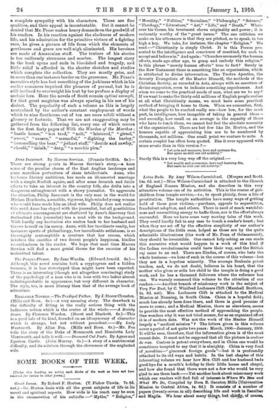SOME BOOKS OF THE WEEK.
[17ncler this heading we notice such Books of the week as have not been reserved for review in other forms.]
Great Issues. By Robert F. Horton. (T. Fishor Unwin. 7s. 6d. net.)—Dr. Horton deals with all the great subjects of life in its .moral and spiritual aspects. How wide 'Is his reach may be seen in the enumeration of his etabiedte :—" Myths." " Religion: " Morality," "Politics," " Socialism," "Philosophy," " Science," "Theology," "Literature," "Art," "Life," and "Death." What- ever his theme, his treatment shows originality and power ; it is eminently worthy of the " great issues." The one criticism we make on his utterances is that they are pitched, so to speak, in too high a key. We take, for instance, the chapter " Religion." Wo read :—" Christianity is simply Christ. It is this Person pre- sented to the intelligence and conscience of mankind, for each to accept and believe in." And again : "Churches are merely the human efforts, made age after age, to grasp and embody this religion." Is this phrase "merely human efforts" true to fact? Surely in the New Testament there is something like an organisation, which is attributed to divine intervention. The Twelve Apostles, the Seventy Evangelists of the Master Himself, the methods of the Christian Society, as recorded in Acts, always with an assertion of divine suggestion, seem to indicate something superhuman. And when we come to the practical needs of men, what are we to say? If we want to make the thirty-odd millions of English people realise at all what Christianity means, we must have some practical method of bringing it home to them. When we remember, first, what the people to be reached really are—how low, for the most part, in intelligence, how incapable of taking in general ideas— and secondly, how small on an average is the capacity of those who have to teach them, we cannot but feel the absolute necessity of the organisation. There are but few like Dr. Horton, and the hearers capable of appreciating him are to be numbered by thousands, not millions. One small point we venture to note. A certain couplet has often been quoted. Has it ever appeared with more errata than in this version ?- " Let acts and manners, laws and systems die, But spare us still our old nobility."
Surely this is a very long way off the original:— "Let wealth and commerce, laws and learning die, But leave us still our old nobility."














































 Previous page
Previous page